We are working on a new DeviceHub release, reimplemented in the Django framework. We’ll keep you posted!
This screenshot is from a working prototype, not final though.
In our work supported by the NGI-Search project, we have achieved several advances in searching, discovering and accessing information about our digital devices. We have a digital product passport (DPP) that shows a history of all hardware configurations a device (a chassis) has or had over a lifespan, with the same chassis and serial but with perhaps different components due to repair, reconfiguration, upgrades, remanufacturing. We record key events of each product item’s lifespan and provide a public record for accountability.
We keep a so-called digital twin for the circular management of ICT devices. The digital information is kept in two sources, one database with details about each action and the documents that detail them, and a ledger or accounting book that builds on append-only storage (organized as a blockchain) so past events cannot be changed.
The DPP is a concept developed by the European Commission for the Sustainable Product Initiative and ecodesign (ESPR). Below there is a video demo of it.
A DPP search engine is an required component of the ESPR. The links in the figure and video below point to a separate DPP registry prototype where product models are registered as a requirement to enter the EU market.
The coins surrounded by a recycling logo represents, implemented as an ERC20 smart contract, a token deposit left by the manufacturer as part of an extended producer responsibility (EPR) scheme, under the principle of “the poluter pays”. Manufacturers leave a deposit according to each product items entering a national market. This deposit waits for years until an accredited professional recycler records a proof of recycling, and auditor validates the processing and proofs, and then automatically and inexorably the deposit is transferred to that recycler, completing the process. Of course, all of these lifespan events are registered in the ledger, providing a transparency log of the circular economy of digital devices.
The software system will be released in March 2024.
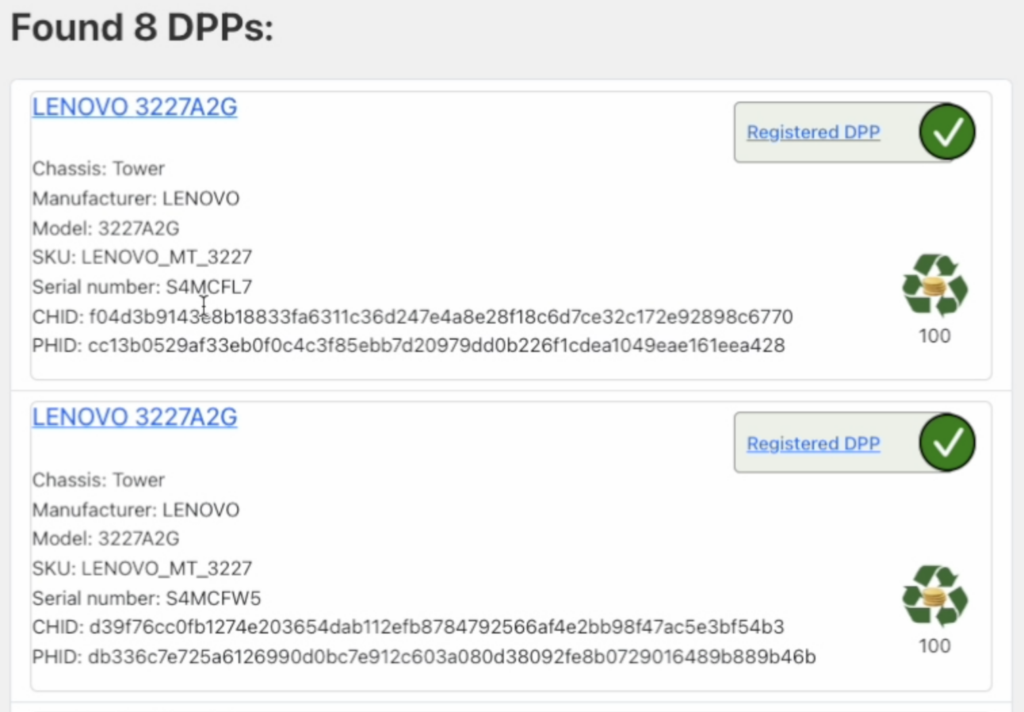
We saw the publication on Friday Oct 6 2023 of this EC recommendation (non-binding) about the need to improve the rate of return of used and waste small digital devices. Interesting but practical?
That message: Dear member states, it is clear we have a problem, and there are many ways, so please do something about it, looks futile. Reuse and recycling critically depend on take-back. We need binding and effective measures.
The EC attitude of taking a look and just sending a reminder is welcome but a pity and irritating when there are binding ways. We appreciate the recommendation by Commissioner V. Sinkevičius, but as As V. Ferrer said, “Misery and suffering are not meant to be understood, but to be solved”. While politics moves slowly and carefully, climate change and environmental degradation is accelerating. Let’s solve this ASAP by moving forward to the next logical step:
We need EU-wide binding e-device return objectives and effective measures to do so, as mentioned in the recommendation.
The eReuse.org team.
(April 2023) We have joined the NGI-Search project to explore how to search, discover and access information about our digital devices.
We work with so-called digital twins for the circular management of ICT devices. The device twins provide identifiers, details & verifiability information (proofs) represented as a digital product passport (DPP).
The DPP is a concept developed by the European Commission for the Sustainable Product Initiative and ecodesign. More details will be coming soon.
A description of eReuse as case in the circular guide APC has published: “A guide to the circular economy of digital devices”, “Una guía sobre la economía circular de los dispositivos digitales”, “Guide de l’économie circulaire de nos appareils numériques”, October, 2021.
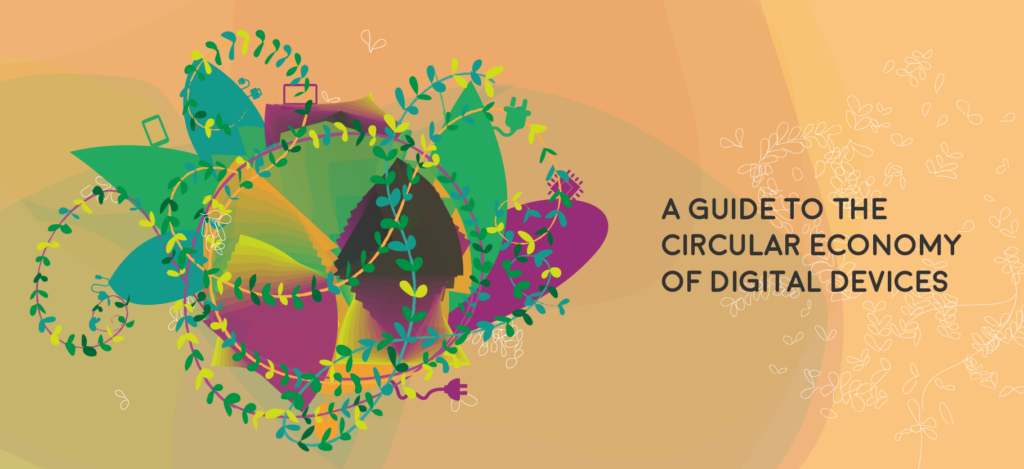
A Public dataset about reuse of computing devices under the eReuse device data commons license (CC BY)
The dataset originates from eReuse.org, a global community formed by social, public and private organizations interested in responsible reuse and recycling of computing devices. Since 2013 eReuse collects details about the second-hand computers and their components collected from resellers, with the purpose of keeping track of these devices and be able to analyze that data over their full lifespan until final recycling.
The devices are handled and data is extracted by different entities using eReuse software tools. They pool together part of their extracted data according to a data commons sharing license. This dataset only contains technical data about the functional status of computing devices and components its contains. Some details were anonymised.
From that data pool, it is possible to deduct detailed life-cycle data for each device across its lifespan if it reported multiple times, from the initial registration of a device until the last recording in a recycling center before being destroyed. The traceability dataset of individual devices and components allows different analysis per device and groupings.
More details of the research and more details on the computing device reuse activities.
We are in a “slow motion” environmental crisis, in comparison with the COVID crisis. There are many more electronic devices than people, and the numbers strongly vary depending on the source. ITU-T estimates 13 billion end-users ICT goods in 2015 and forecast 20 billion by 2030 (ITU-T_L.1470). The production of an ICT good has many times higher environmental impact than usage over their whole lifespan (Life-Cycle Assessment of Consumer Electronics). For that reason, the circular economy aims at eliminating waste and the continual use of resources, and represents an strategy to transform industrial processes to be more sustainable.
The mission of the eReuse community, shared with the USOdy initiative, is the transition to a collaborative and circular consumption of electronics. Some aims to achieve this:
We have been busy implementing a distributed ledger as a distributed source of truth for the traceability of computer devices. Every relevant operation on a device (ownership transfer, recycling, etc) is logged in our permissioned blockchain. Moreover, it is programmed to generate Proofs, that act as attestations about a past action or state of a device.
The use of the blockchain can provide, apart from a multi-stakeholder traceability system, a flexible approach to enforcing incentives throughout a device life-cycle. In the Ledger project, we have developed an incentive scheme according to which a form of a deposit is included in every device transfer between participants. This strategy, to promote the reuse and recycle of the devices with a “Deposit return system”, has been shown for other resources to be the most effective and sustainable way to make a zero waste circular economy happen as it maximises the lifespan of devices as useful resources.
However, that needs a careful data collection and processing policy:
This way, the ledger does not store any personal data, just proofs of it, and thus only meaningful for those that already have it. We use smart contracts to count and record results agreed to be made public (e.g. statistical data) to measure circularity, such as durability metrics for models and manufacturers, but individual details are not recorded.
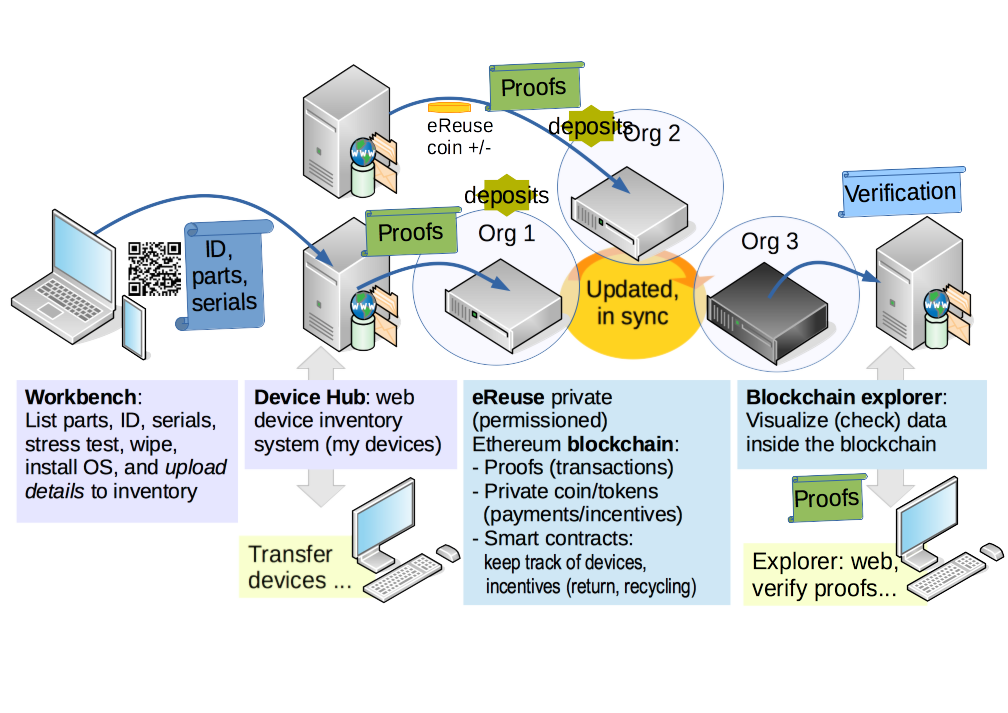
 In eReuse we definitely share the perspective of the Right to Repair campaign. The right is fundamental for reuse and for ensuring the longest lifespan of electronics, and even to give more usefulness and value to parts obtained from recycling. We joined the campaign!
In eReuse we definitely share the perspective of the Right to Repair campaign. The right is fundamental for reuse and for ensuring the longest lifespan of electronics, and even to give more usefulness and value to parts obtained from recycling. We joined the campaign!
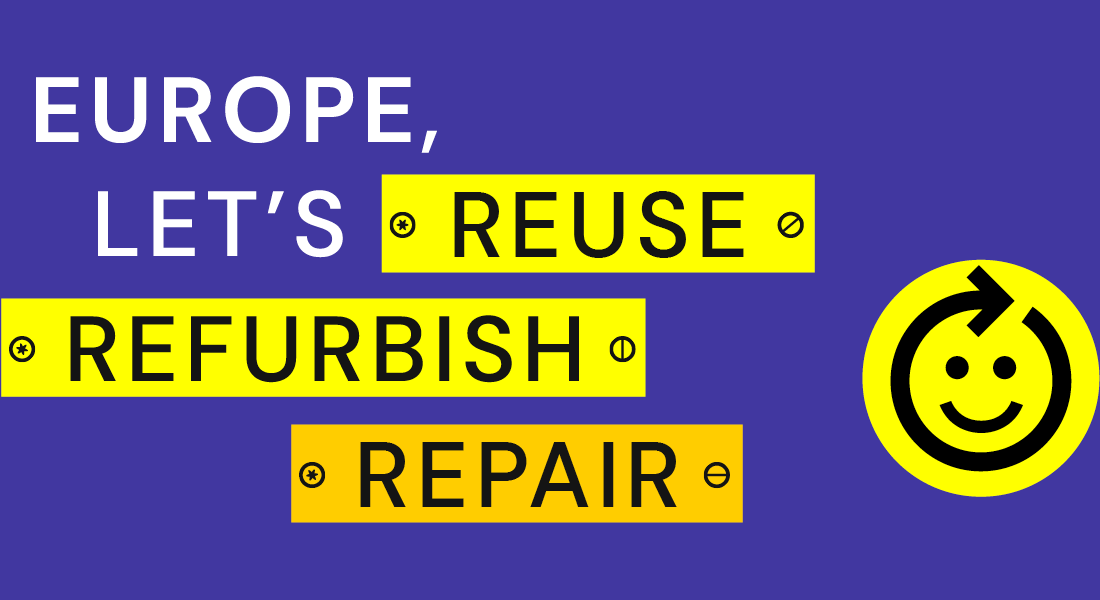
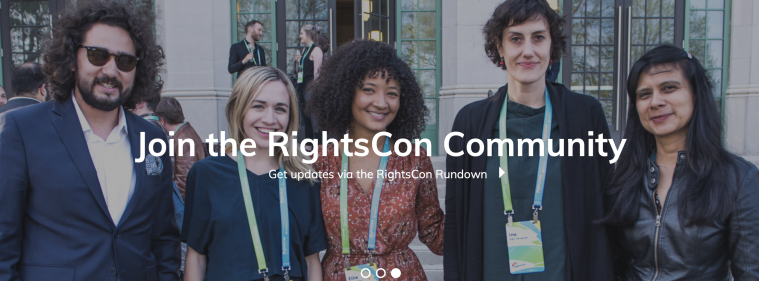
Today 11 June starts RightsCon, the world summit that brings together initiatives and leading experts for their work on human rights in the digital age. RightsCon is an annual meeting that promotes AccessNow, one of the pioneering initiatives in defending groups around the world most vulnerable to technologies, in 5 axes: privacy, freedom of expression, digital security, human rights within digital companies and digital discrimination.
RightsCon takes place this year in Tunisia for 4 days and organizes its programming in 17 themes that add up to more than 450 sessions with more than 2500 participants from 130 countries.
From Pangea.org/eReuse.org, Leandro Navarro will participate tomorrow, Wednesday 12 June, in the session entitled “Climate change under construction: an environmentally sustainable Internet” along with other participants from the United Kingdom, Bulgaria, Hungary and France.
LEDGER, a European Commission funded project looking for people working on decentralized technologies to give back citizens control over their data, held its Jury Day on Tuesday 28 May in Amsterdam.
The jury was to choose the 16 projects who are going to enter the one-year venture builder programme. The winners passed a thorough selection process with the 33 finalists pitching last Tuesday in front of a Jury made up by 8 qualified experts and professionals from the following organisations: Nesta, NLnet, Geant, Demos Helsinki, Decode and the 3 partners leading the project (FundingBox, Dyne.org, BluMorpho).
LEDGER promotes alternative models where data is a common good owned by citizens and wealth created by data-driven platforms is equally distributed. The Project supports Research and Innovation projects addressing decentralised technologies such as blockchain as well as privacy-by-design, reliability, trustworthiness and openness as core values.
The winners by alphabetic order are the following:
The selected projects will now have the opportunity of going far deeper in the fulfilment of their concept as they will enter a 12-month acceleration phase during which they will benefit from:
About LEDGER:
LEDGER is part of the Next Generation Internet (NGI) initiative, launched by the European Commission with the following ambition: shape the Internet in such a way that it is more transparent, inclusive, open, cooperative and respectful of data privacy.
With this goal in mind, LEDGER is a Minimum Viable Product programme encouraging developers, researchers, designers and entrepreneurs to use decentralised technologies such as blockchain, peer to peer and distributed ledger to build human-centric solutions to preserve the citizens’ sovereignty over their data.
Related links:
Site: //ledgerproject.eu
Open call site: //ledger-open-call.fundingbox.com/
Community site: //ledger.fundingbox.com/
//ngi.eu/
//www.fundingbox.com
//www.dyne.org
//www.bluemorpho.com
//twitter.com/LedgerEu
#LedgerEU #NGI4eu #NGI
Contact:
Andrés Sánchez Sandaza
andres@fundingbox.com